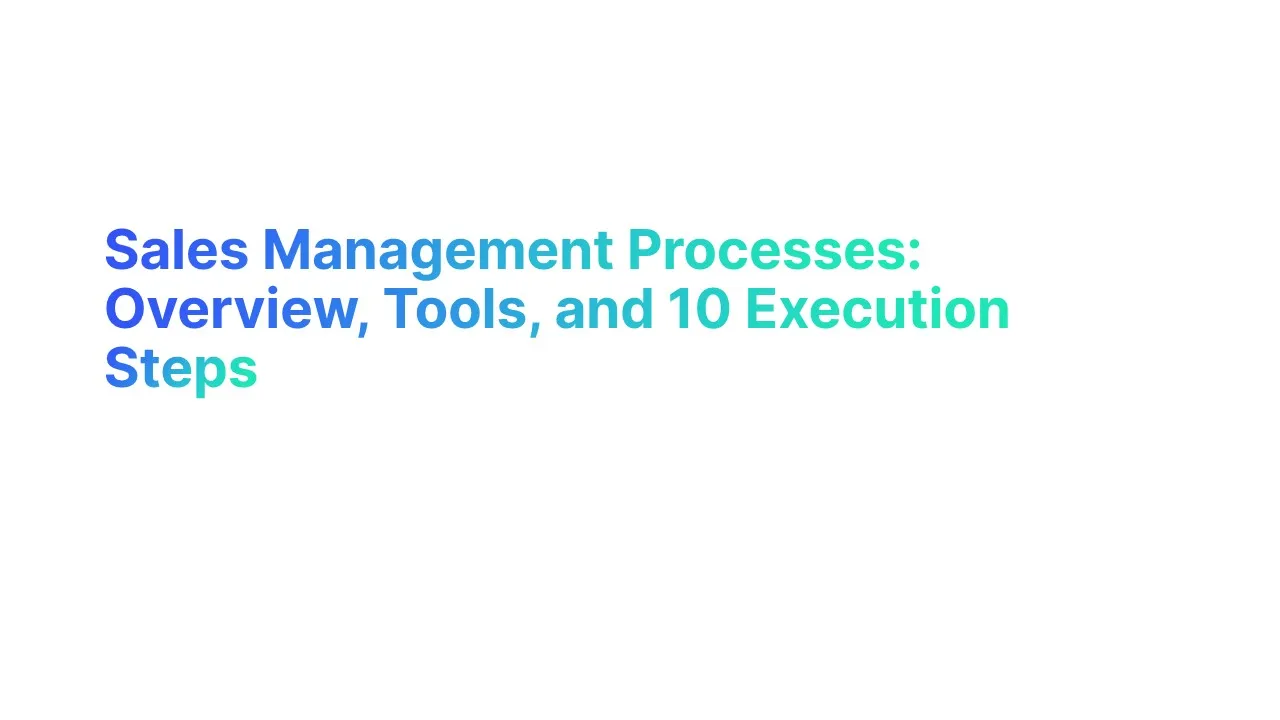What Are Discovery Calls?

Discovery calls are the first conversations between sales reps and potential clients. They help sales reps understand the needs and challenges of prospects. These calls are crucial for making a good impression and building trust.
Importance of Discovery Calls in the Sales Process
Discovery calls play a big role in the sales process. Here are some reasons why sales discovery call are important:
1. Understanding Prospect's Pain Points
- Identify Challenges: In a discovery call, sales reps ask questions to find out the prospect's pain points. This helps them understand what problems the potential client is facing.
- Example Question: "What challenges are you experiencing with your current solution?" This helps in identifying areas where the sales rep's product or service can help.
2. Building a Strong Relationship
- Show Genuine Interest: Discovery calls are a great way to start building a relationship with the potential client. By showing genuine interest in their problems, sales reps can build rapport and trust.
- Importance of Trust: This is important because people are more likely to do business with someone they trust.
3. Providing Valuable Insights
- Share Expertise: During these calls, sales reps can offer valuable insights to the potential client. For example, they can share how other clients have solved similar problems.
- Benefits: This not only helps the potential client but also shows the expertise of the sales rep.
4. Identifying Key Decision Makers
- Understand Decision Process: Understanding the decision making process is crucial. Sales reps need to know who the key decision makers are.
- Tailor the Pitch: This helps them tailor their pitch to the right people. They might ask, "Who will be involved in the decision-making process for this purchase?"
5. Gathering Essential Information
- Ask the Right Questions: Sales reps use discovery call questions to gather important information. They might ask about the current solution, budget, and goals.
- Tailored Solutions: This information is vital for creating a tailored solution that meets the client's needs.
6. Setting the Stage for a Successful Outcome
- Plan for Success: A well-conducted discovery call sets the stage for a successful outcome. Sales reps can use the information gathered to create a customized sales pitch.
- Increase Closing Chances: This increases the chances of closing the deal.
7. Follow-Up and Next Steps
- Set Clear Steps: At the end of the call, it's important to set clear next steps. This could include scheduling a [follow up call] or sending additional information.
- Ensure Smooth Process: Clear follow-up ensures that the sales process moves forward smoothly.
According to Salesforce, 82% of buyers think a seller who takes the time to understand their business adds value. Also, 65% of buyers say a positive experience with a brand is more influential than great advertising.
15 Best Discovery Call Questions to Ask Prospects

1. Understanding the Prospect's Pain Points
Example Questions:
What challenges are you currently facing in your [current solution] process?
Knowing the problems with their current solution is key. This helps you understand what they need and where your product can help.
- Why it’s important: It shows you care about solving their problems.
- How it helps: It helps you tailor your pitch to address their specific issues.
Can you describe any specific pain points that have been a major hurdle for your team?
Ask them to explain the main pain points. This can give you a clear idea of their biggest challenges.
- Why it’s important: It helps you identify their main concerns.
- How it helps: It allows you to focus on how your product can solve these pain points.
2. Uncovering the Sales Discovery Process
Example Questions:
What does your typical sales discovery process look like?
Understanding their sales discovery process helps you see how they identify and address customer needs.
- Why it’s important: It provides insight into their approach.
- How it helps: It lets you show how your product fits into their process.
How do you currently handle the initial stages of the discovery process?
Knowing their steps at the start of the discovery process can help you offer better solutions.
- Why it’s important: It shows you understand their workflow.
- How it helps: It helps you suggest improvements or enhancements with your product.
3. Decision Making Process Insights
Example Questions:
Who are the key decision makers involved in your [decision making process]?
Identify the key decision makers. This helps you know who has the final say.
- Why it’s important: It ensures you address the right people.
- How it helps: It helps you tailor your pitch to the decision makers.
Can you walk me through your [buying process] and how decisions are typically made?
Learn about their buying process. This helps you understand the steps they take to make a purchase.
- Why it’s important: It provides a clear picture of their decision-making.
- How it helps: It helps you align your sales process with their buying process.
4. Assessing the Current Solution
Example Questions:
What do you like about your [current solution], and what could be improved?
Ask what they like and dislike about their current solution. This helps you see where your product can be better.
- Why it’s important: It shows you are interested in their preferences.
- How it helps: It helps you highlight your product’s strengths and address any gaps.
How effective is your current process in meeting your needs?
Understand if their current process is effective. This helps you show how your product can make it better.
- Why it’s important: It shows you care about their success.
- How it helps: It allows you to demonstrate the value of your product.
5. Probing for a Comprehensive Understanding
Example Questions:
Can you share more details about your sales journey/ sales cycle and any hurdles you encounter?
Learn about their sales pipeline, cycle and challenges. This gives you a deeper understanding of their process.
- Why it’s important: It helps you understand their workflow.
- How it helps: It allows you to provide more targeted solutions.
What are some [key metrics] you use to have successful sales reps measure success in your sales process?
Identify the metrics they use to measure success. This shows you understand their goals and benchmarks.
- Why it’s important: It shows you are aligned with their success measures.
- How it helps: It helps you demonstrate how your product can help them achieve these metrics.
6. Exploring Potential Solutions
Example Questions:
What features would the [right solution] need to address your specific pain points?
It's important to understand what the prospect needs. Ask about features they want in a solution. This helps you see if your product fits their needs. For example, if they need faster processing, you can highlight how your product delivers speed.
- Why it’s important: This shows you care about their needs and want to solve their problems.
- How it helps: It builds trust and makes it easier to tailor your pitch.
Have you considered any [new solutions] recently? If so, what stood out to you?
Knowing if they've looked at other solutions helps you understand their preferences. Ask what they liked about other options. This can give you ideas on what to emphasize about your product.
- Why it’s important: This shows you respect their research and are ready to offer a better option.
- How it helps: It allows you to highlight your product's strengths compared to others.
7. Delving into the Buyer's Journey
Example Questions:
Can you outline your [buyer's journey] and any touchpoints that are critical?
The buyer's journey is the process they go through to make a purchase. Ask them to explain this journey. Knowing critical touchpoints, like when they need more information or a demo, helps you plan your approach.
- Why it’s important: Understanding their process helps you provide the right information at the right time.
- How it helps: It makes your interactions more relevant and timely.
What stages in the [purchasing process] are most challenging for your sales team?
Every team faces challenges during the purchasing process. Ask about these challenges. This can help you show how your product can make their job easier.
- Why it’s important: It shows you are interested in making their work easier.
- How it helps: It allows you to position your product as a solution to their problems.
8. Evaluating Sales Discovery Calls
Example Questions:
What makes a [great discovery call] for you?
Ask them what they expect from a discovery call. Knowing this helps you tailor your approach to meet their expectations.
- Why it’s important: Meeting their expectations makes a positive impression.
- How it helps: It increases the chances of a successful outcome.
Can you recall a [successful discovery call] and what factors contributed to its success?
Learn from their past experiences. Ask them to describe a successful call. This can give you insights into what works well.
- Why it’s important: Understanding success factors helps you replicate them.
- How it helps: It provides a blueprint for your discovery calls.
9. Identifying Valuable Insights
Example Questions:
What kind of [valuable insights] are you looking to gain from a discovery call?
Prospects often seek specific insights. Ask what they want to learn. This helps you focus on providing the information they need.
- Why it’s important: It shows you are there to help, not just to sell.
- How it helps: It makes your calls more useful and informative.
How do you currently gather [valuable insights] during your sales process?
Find out their current methods for gathering insights. This can help you suggest better ways your product can assist them.
- Why it’s important: Understanding their current process shows you are interested in improving it.
- How it helps: It allows you to highlight the benefits of your product in their context.
10. Assessing the Sales Team's Role
Example Questions:
How do your [sales teams] collaborate during the discovery process?
Team collaboration is key in the discovery and purchase process. Ask how their sales teams work together. This can help you show how your product supports teamwork.
- Why it’s important: It shows you understand the importance of teamwork.
- How it helps: It allows you to emphasize features that enhance collaboration.
What role does your [sales manager] play in overseeing discovery calls?
Sales managers often guide discovery calls. Ask about their role. This can help you address how your product can assist managers in tracking, improving and conducting discovery calls themselves.
- Why it’s important: It shows you recognize the manager's role in the process.
- How it helps: It positions your product as a tool for better management.
11. Building Rapport and Trust
Example Questions:
How important is [building rapport] with potential clients during discovery calls?
Building rapport means creating a friendly connection with your clients. It is important because it makes clients feel comfortable and valued. When clients trust you, they are more likely to share honest information.
- Why it’s important: Trust helps you understand their real needs.
- How it helps: It makes clients more open and cooperative.
What strategies do you use to foster [genuine interest] in your clients?
Show genuine interest in potential customer by asking about their challenges and goals. Listen carefully to their answers. This shows you care about them, not just the sale.
- Why it’s important: It builds a strong relationship.
- How it helps: It helps you provide better solutions.
12. Active Listening Techniques
Example Questions:
How do you ensure you are [actively listening] during discovery calls?
Active listening means paying close attention to what the client says. To do this, make notes, ask follow-up questions, and repeat back what you heard to confirm.
- Why it’s important: It shows you understand their needs.
- How it helps: It helps you respond accurately to their concerns.
Can you share examples of how [active listening] has helped in better understanding client needs?
For example, if a client mentions they need faster software, you can suggest how your product’s speed can help. Listening closely helps you pick up on these needs.
- Why it’s important: It ensures you address their specific issues.
- How it helps: It helps you make relevant recommendations.
13. Follow-Up Strategies
Example Questions:
What follow-up steps do you take after a [discovery call] to keep the conversation going?
After a discovery call, send a summary of the first call, next steps, and additional information they might need. Schedule a follow-up call to discuss further.
- Why it’s important: It keeps the momentum going.
- How it helps: It shows you are organized and proactive.
How do you determine the best approach for a [follow-up call] with a prospect?
Consider their needs and the information you gathered during the discovery call. Tailor the follow-up to address their specific concerns and questions.
- Why it’s important: It shows you listened and understood their needs.
- How it helps: It increases the chances of a successful outcome.
14. Addressing Key Metrics and Goals
Example Questions:
What are the [key metrics] you aim to improve through your sales discovery process?
Key metrics are the important numbers you want to improve, like sales targets, customer satisfaction, or product usage. Knowing these helps you focus your efforts.
- Why it’s important: It aligns your efforts with their goals.
- How it helps: It shows you are results-oriented.
How do you align your discovery questions with your [desired outcome]?
Ask questions that reveal how your product can meet their goals. For example, if they want to increase efficiency, ask about their current process and how it can be improved.
- Why it’s important: It ensures your questions are relevant.
- How it helps: It leads to more meaningful conversations.
15. Uncovering Missed Opportunities
Example Questions:
Have you identified any [missed opportunities] in your current discovery process?
Missed opportunities are chances to improve that you didn’t see before. Ask clients if they think anything was overlooked.
- Why it’s important: It shows you want to improve.
- How it helps: It helps you refine your approach.
How do you plan to address these [missed opportunities] to achieve more deals and better results?
Create a plan to address these missed opportunities. For example, if clients felt their concerns were not fully addressed, make sure to focus more on their pain points in future calls.
- Why it’s important: It shows you are committed to improvement.
- How it helps: It helps you achieve better results and build stronger relationships.
6 Key Tips for a Great Discovery Call

1. Preparing for the Discovery Call
Before making a good discovery call, you need to prepare. This means doing your homework on the prospect.
Why it matters:
Preparation helps you understand the prospect's needs. It shows you care and are serious about helping them.
How to implement:
- Research the Prospect: Learn about their company, their role, and their challenges. Look at their website, LinkedIn, and any other available information.
- Know Your Product: Be ready to explain how your product can help them. Understand its features and benefits well.
- Plan Your Questions: Prepare a list of discovery call questions. These questions should help you learn about the prospect's pain points and goals.
Example: If you're calling a company that makes sports equipment, find out what new products they are launching. Ask questions like, "What challenges do you face with your current solution for your sales professionals managing inventory?"
2. Creating a Strong Call Agenda
A call agenda is a plan for how the call will go. It helps keep the conversation on track.
Why it matters:
An agenda ensures that you cover all important points. It shows the prospect that you are organized and respect their time.
How to implement:
- Outline Key Points: List the main topics you want to discuss. For example, start with introductions, then talk about their needs, and finally present your solution.
- Send the Agenda Ahead of Time: Email the agenda to the prospect before the call. This allows them to prepare and know what to expect.
- Be Flexible: While an agenda is important, be ready to adjust it based on the flow of the conversation.
Example: Start your agenda with, "First, we will discuss your current process. Next, we will talk about the challenges you face. Finally, we will see how our new solution can help."
3. Asking Open-Ended Questions
Open-ended questions require more than a yes or no answer. They encourage the prospect to share more information.
Why it matters:
These questions help you understand the prospect's needs and pain points better.
How to implement:
- Ask About Challenges: Questions like, "What challenges are you currently facing in your sales process?" help uncover problems.
- Explore Goals: Ask, "What are your key metrics for success?" to understand their goals.
- Follow Up: Use probing questions to get more details. For example, "Can you tell me more about why this is a priority now?"
Example: Instead of asking, "Do you like your current solution?" ask, "What do you like about your current solution, and what would you change?"
4. Highlighting the Value Proposition
Active listening means fully concentrating on what the prospect is saying.
Why it matters:
It shows that you value their input and helps you gather important information.
How to implement:
- Take Notes: Write down key points during the call.
- Repeat Back: Summarize what they said to confirm your understanding. For example, "So, you're saying that managing inventory is a major challenge because of frequent stockouts?"
- Avoid Interruptions: Let the prospect finish speaking before you respond.
Example: If a prospect says, "We struggle with keeping track of inventory," you might reply, "I understand that inventory management is a challenge. Can you share more about how this affects your daily operations?"
5. Utilizing Discovery Call Scripts
Offer useful information that helps the sales conversation and the prospect see the value in your product.
Why it matters:
Providing insights builds your credibility and shows that you understand their industry.
How to implement:
- Share Case Studies: Talk about how other clients solved similar problems with your product.
- Offer Data: Use statistics and data to support your points.
- Give Recommendations: Suggest practical steps they can take.
Example: "One of our clients, a sports equipment manufacturer, reduced stockouts by 30% using our inventory management solution. This led to smoother operations and higher customer satisfaction."
6. Following Up Effectively
Following up after a discovery call keeps the conversation going and shows that you are committed.
Why it matters:
It helps maintain momentum and ensures that the prospect doesn't forget about your discussion.
How to implement:
- Send a Summary: Email a summary of the call, including the key points discussed and the next steps.
- Schedule a Follow-Up Call: Arrange a time for the next call to discuss further.
- Provide Additional Information: Send any extra materials that might help them, like brochures or case studies.
Example: "Thank you for your time today. Here is a summary of our discussion. Let's schedule a follow-up call next week to go over any further questions you might have."
Conclusion
Discovery calls are essential for a successful sales process. They help you understand your prospect's pain points, build trust, and provide valuable insights.
By asking the right sales discovery call questions and actively listening, you can uncover key metrics and improve your sales discovery process. With these skills, you can conduct great discovery calls and achieve a successful outcome.





.png)



